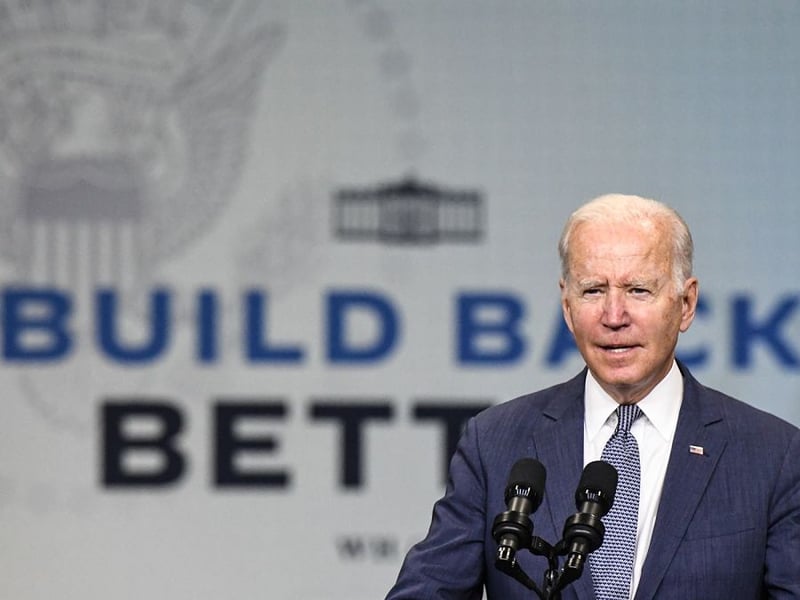

Financial advisers who were worried that a massive tax and spending package being cobbled together in Congress would substantially change how their clients save for retirement, pass assets to heirs and pay taxes on their investments and wealth can breathe a little easier.
The White House released a framework Thursday for the so-called Build Back Better bill that contains $1.75 trillion in spending on an array of health care, education and climate programs. It also outlines nearly $2 trillion in tax increases and other revenue measures to pay for the spending.
The tax increases include a 15% minimum corporate tax and a new income surtax on the top 0.02% of taxpayers, according to the White House. The surcharge would be a 5% rate on income above $10 million and an additional 3% on income above $25 million.
Just as notable as what was in the framework was what was left out.
In September, the House Ways and Means Committee approved its portion of the Build Back Better bill, which would have ended back-door conversions to Roth individual retirement accounts, put limits on mega IRAs, raised capital gains and individual tax rates for high earners and lowered the estate tax exemption, among other revenue-raising provisions.
The House bill also included a provision that would have required businesses that don’t offer a retirement plan to workers to establish an automatic savings program for them.
Another idea that emerged this week for inclusion in the Build Back Better bill was a plan by Senate Finance Committee Chairman Ron Wyden, D-Ore., to establish a so-called billionaires income tax that would assess a levy on unrealized capital gains of the ultra-wealthy.
All of those provisions appear to have fallen by the wayside in the framework, which is the Biden administration’s attempt to cobble together a compromise bill that would unite congressional Democrats.
Build Back Better started as a $3.5 trillion proposal and it's now been whittled back to less than $2 trillion. As it shrank, so have related tax increases.
The framework must now be turned into legislative text, a process that leaves plenty of room for further changes, as the White House and Democratic leaders try to bridge the differences between progressive and moderate Democrats.
“What’s in it and how it’s paid for is going to ebb and flow daily,” said Jeff Forbes, founding partner of Forbes Tate, a government relations consulting firm. “There will be many tweaks to this before it is signed into law but probably not a ton of huge robust changes.”
The tax increases proposed to finance the bill — as well as spending provisions — have changed almost daily to accommodate centrist Democratic Sens. Kyrsten Sinema of Arizona and Joe Manchin of West Virginia. A parliamentary process is being used to advance the bill that sidesteps a Republican Senate filibuster but it requires all 50 Senate Democrats to be on board.
“We’ll see what Congress does as they search under the couch cushions to pay for this bill,” said Michael Kreps, principal at Groom Law Group. “Until there is legislative text, I wouldn’t rule anything out.”
But if something isn't in the framework, such as the automatic retirement savings plan provision, it faces a big obstacle in getting into the final bill.
“It’s probably very unlikely the universal [retirement] coverage provision will be included in the final legislation given the cost,” Kreps said.
That’s a disappointment to the Insured Retirement Institute. It had been a strong proponent of the auto-retirement plan idea, which was championed by House Ways & Means Chairman Richard Neal, D-Mass.
IRI saw the auto-savings provision as a way to create millions of new retirement savers and trillions of dollars in new retirement savings, especially for lower- and middle-income workers. Republicans opposed it, calling it punitive toward small businesses that didn't comply.
“We thought that was a really good policy,” said Paul Richman, IRI chief government and political affairs officer. “It fit well with the goals and objectives of the overall Build Back Better agenda.”
The organization is hopeful Congress will return to the so-called SECURE 2.0 retirement savings bill that was approved unanimously by the House Ways & Means Committee earlier this year.
“We’re going to be focusing our attention now on SECURE 2.0 and trying to move that forward,” Richman said.
But for the next few weeks, Congress will concentrate on the Build Back Better bill and a separate bill that contains more than $1 trillion in spending on the nation’s physical infrastructure, such as roads, bridges, railways and the internet.
Congressional Democrats won’t get any Republican votes on Build Back Better and they have no margin for error in the Senate and only a very narrow one in the House, where they have a three-vote majority.
“They are all over the place,” Kreps said. “Getting everyone on board is a huge, heavy lift.”

The looming threat of federal funding cuts to state and local governments has lawmakers weighing a levy that was phased out in 1981.

The fintech firms' new tools and integrations address pain points in overseeing investment lineups, account monitoring, and more.

Canadian stocks are on a roll in 2025 as the country prepares to name a new Prime Minister.

Carson is expanding one of its relationships in Florida while Lido Advisors adds an $870 million practice in Silicon Valley.

The approval of the pay proposal, which handsomely compensates its CEO and president, bolsters claims that big payouts are a must in the war to retain leadership.
RIAs face rising regulatory pressure in 2025. Forward-looking firms are responding with embedded technology, not more paperwork.
As inheritances are set to reshape client portfolios and next-gen heirs demand digital-first experiences, firms are retooling their wealth tech stacks and succession models in real time.
